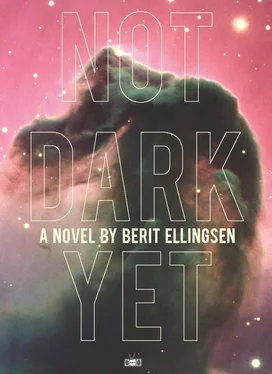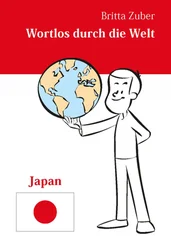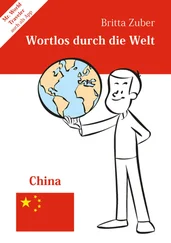The morning was still and quiet, dusted by a thin layer of fog, which softened the cuts and wounds visible from the storm. The flagstones that had lined the flower beds and kitchen garden outside Eloise and Mark’s house had been pulled along with the water and strewn out on the pitted, still partly submerged lawn below. Only bits of the garden plants remained, shreds of crocuses, snowdrops, and daffodils, branches of apple and cherry trees scattered on the grass, some jutting out of or floating on the shallow lake created by the flood, along with roof panes and planks that had been torn off the house and barn. In the scars dug by the flooding in the gravel between the buildings water still ran, beneath small overhangs of soil that threatened to collapse. A red and yellow toy lay muddied and squished against the corner of the ramp to the silo tower. The air smelled of mud and smoke.
Along the path to the cabin the vegetation had been flayed, revealing soil or jagged bedrock where the earth had been washed out into the ditch on either side of the trail. In the fields that flanked the path, water was no longer frothing and churning, but stood still and dark like a new sea. The winter wheat had been bunched up into uneven, lopsided stacks, then flattened from every direction, or stood snapped with the head in the water. It looked like someone had gone over the stalks with a broad, dull scythe, harvested nothing, yet trampled everything. From where he stood he couldn’t see a single square meter that wasn’t broken or drowned. Even if the water drained from the fields, there would be no crop this spring. And who could say what the weather would be like the following winter, or when the next flood would come? Their project was over. When he realized that, his feet stopped by themselves on the disarrayed, overturned substrate, and he covered his mouth with his hand.
He feared that the cabin had collapsed either from the wind or runoff from the nearby hill, even if the cabin stood some distance away from its slope. As he passed the slight dip in the path where it started to curve up toward the cabin, the fog thinned sufficiently to see the red-painted structure. At least it was still there. He hurried the rest of the way, his breath catching in his throat.
The door was still in its frame, but hanging askew on the upper hinges, with the bottom of the sun-bleached wood brown with mud. The deck was littered with grass, leaves, and branches from the hill. He kicked the worst of the debris away from the door and stepped over the rest. Inside the cabin’s single room the water had smashed through the panorama window on its way back to the heather. Some of the glass remained on the floor by the gaping opening, the rest had scattered like a glittering stream on the mud outside. The walls were moist and spattered like the cliffs in a river gorge, and banks of dirt and vegetation had been deposited along them. In the northwest corner the rain had leaked in through the roof and streaked the wall with moisture. A small stream still trickled on the hardwood floor, filling the hearth with mud. The sofa lay outside the window, overturned and at an awkward angle, and the middle cushion sailed further afield. His small backpack and sleeping bag lay soaked in the east corner, just inside the broken glass. Of his treadmill, laptop, and mattress there were no signs; he assumed they were buried in the shallow flood lake somewhere. Only the kitchen had escaped substantial damage. The stove and the sink were still in place, but when he turned the faucet on it trembled and spat only brown water. The well must have been flooded too. He opened the powerless fridge. Inside the rubber-sealed darkness his phone and wallet lay dry and safe on the shelf where he had left them.
He took out the phone and was surprised to see that it still had service, although a barely detectable signal. At the edge of the drowned hearth he sent a short note to Michael, saying that he loved him and that he hoped everyone at home was all right after the hurricane. Then he deleted the email account, the phone’s contact list, and reset the phone to factory settings. Finally, he dialed Kaye’s number and texted a single word: “Yes.”
FURTHER NORTH ALONG THE COAST SAT A POWER plant, the spider in the center of a web of gently curving power lines held aloft by a forest of steel pylons, every tenth tower reinforced to prevent the ice in winter storms from pulling them down. The plant was large enough to provide the region with electricity, but not new enough for modern coal scrubbing methods, or important enough to have advanced security measures. Instead, it seemed to have been partly left to anonymity and civil obedience not to obstruct the giant and its humming supply of power and normality. There had been plans to decommission the plant for years, but the public dislike of nuclear power and the lack of properly developed alternatives, coupled with a sharp increase in the price of power from abroad, no matter the source, secured the single largest emitter of greenhouse gases along that part of the coastline a continued existence.
Kaye had blueprints, door codes, key cards, showed him everything they needed to do, in the illumination from a single light bulb in the basement of a house that was identical to all the others in the streets and courts and crescents around it, all of them empty and unused, owned by a financial institution that was holding out for better times and higher prices that never seemed to happen.
He walked there with the hood of the sweater beneath his short wool coat up to shield him from the gaze of surveillance cameras on the train station, bus station, and the bus. The sky was white and heavy and the cold wind flurried with snow flakes, several months late for Christmas. The roads south were still closed, and air and rail travel there suspended, to the rage of the crowds of passengers now stuck on other parts of the continent. However, north of the hurricane’s path of destruction, life continued more or less like before, with travel interrupted for only a few days after the disaster. He didn’t expect to hear anything from Michael or Katsuhiro until phone and internet communication was restored.
The neighborhood in the northern city he traveled to had been developed, but not yet inhabited, so there was no bus nor tram line close to the address Kaye had texted him. He exited the bus at the nearest possible stop, crossed the road and an incomplete sports field with an expanse of newly planted, but already yellowed grass. Even here signs of recent bad weather were clearly visible: drains clogged with branches, fresh cracks and pot holes in the road, roof tiles and wayward planks on the pavement. The seating in the putative arena had only been partly completed, leaving broken scaffolding and plastic nets scattered about, torn loose by the elements. The evening wind rose and shrieked through the unfinished structure.
Past the sports field the residential streets were flanked by small gardens with gable-roofed, semi-detached houses in various stages of completion. The first properties were unfinished, lacking roofs or top floors, with pallets of shingles and paving still wrapped in plastic in the driveways. Further inside the neighborhood the houses had been roofed, painted a peachy yellow, and equipped with white Palladian windows in the fronts, showing off hardwood-floored halls and stairs inside. A few of the future homes even had brass chandeliers shining behind the windows and cone-shaped juniper bushes bounding their gardens, but no curtains, furniture, nor cars, so he assumed those buildings were marketing displays for selling. He wondered, if he continued in the same direction, whether the houses would become more and more inhabited, until rooms furnished with beds, closets, and chairs, tables set with meals, tubs filled with water, and hallways cluttered with shoes and clothes would appear, like landlocked ships abandoned by their owners. Or had he already reached the apex and the properties further in would only be less complete, with the roofs, walls, and floors vanishing in an inverted sequence from the structures he had already passed, until only concrete foundations and the burrows created by rock blasting to cradle them were all that was left of the houses? He had no desire to witness that and did not plan to walk further into the neighborhood than he had to, yet nevertheless experienced a small flash of regret knowing that he would never see what the houses farther inside looked like and that he might never return to find out.
Читать дальше












